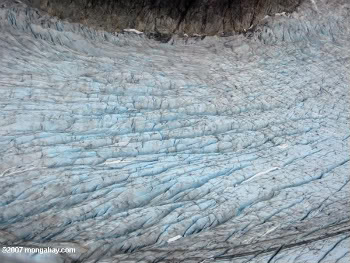|
|
United Nations Secretary General Ban Ki-Moon spoke on Monday of the challenges facing the world and singled out climate change as the greatest.
“We have less than 10 years to halt the global rise in greenhouse gas emissions if we are to avoid catastrophic consequences for people and the planet. It is, simply, the greatest collective challenge we face as a human family,” Ban Ki-Moon said during his keynote speech to the World Federation of U.N. Associations.
The Secretary General set his sights on an international meeting taking place in five months where nations are planning to craft a new framework to tackle climate change after the Kyoto treaty expires in 2012.
 Mendenhall glacier in Alaska. Photo by: Rhett A. Butler. |
“This December, in Copenhagen, we have a chance to put in place a climate-change agreement that all nations can embrace,” Ban Ki-Moon said, adding that “we have a chance to put in place a climate change agreement that all nations can embrace, which will be equitable, balanced, comprehensible.”
In his speech, Ban Ki-Moon also highlighted the threat of nuclear proliferation and called for disarmament. He urged that the world change the meaning of the acronym WMD from Weapons of Mass Destruction to We Must Disarm.
Ban Ki-Moon encouraged nations to work together to tackle the multiple problems facing the globe.
“We are living through an age of multiple crises,” he said. “Fuel, flu and food, and most seriously, financial. Each is something not seen for years, even for generations. But now they are hitting us all at once. None of these problems can be solved by any single nation acting alone.”
The UN Secretary-General spoke in Seoul, South Korea on a 10 day visit to his home country.
Related articles
Global ocean temperatures at warmest level since 1880

(07/21/2009) Global ocean temperatures rose to the warmest on record, according to data released last week by the National Oceanic and Atmospheric Administration (NOAA). The combined average global land and ocean surface temperature for June was second-warmest since global recording-keeping began in 1880. NOAA also reported a return of el Niño, raising the prospect of dryness—and risk of forest fires—in Southeast Asia.
Russia pledges to raise carbon emissions to combat global warming
(06/25/2009) In a bizarre announcement that threatens to further weaken the international community’s ability to come together on climate change, Russia has said it will reduce its emissions 10-15 percent from 1990 levels by 2020. The problem is that in 1990 Russia’s carbon emissions were much higher than they are today, so this ‘lowering’ of carbon emissions actually means that Russia will raise its emissions by 2 to 2.5 percent annually until 2020.
CO2 currently at highest level in 2.1 million years
(06/18/2009) Atmospheric carbon dioxide levels are higher than any point in the last 2.1 million years, report researchers writing in the journal Science.